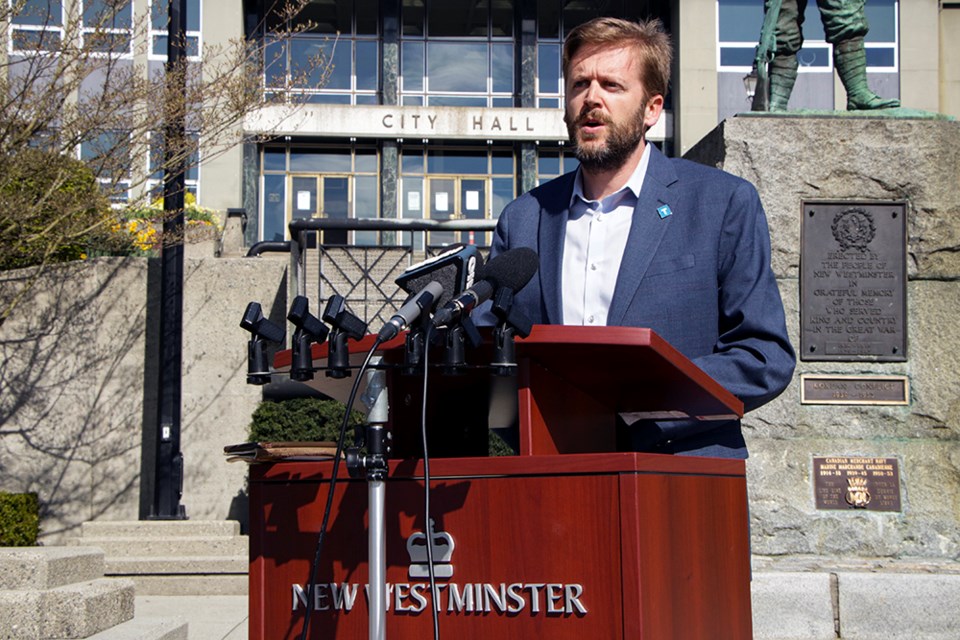TransLink needs emergency funding relief from senior governments or transit services in the region will be “unrecognizable” after the COVID-19 crisis.
Metro Vancouver commuters will see unprecedented cuts to transit services unless the transportation authority gets emergency funding to offset losses incurred for providing essential transit services during the pandemic, said a TransLink press release.
“TransLink’s revenue is down $70 million a month or $2.5 million a day,” said Mayor Jonathan Cote, chair of the Mayors’ Council on Regional Transportation. “Our transit agency relies heavily on being funded by transit fares and the gas tax. With transit ridership down 80% and driving down 60%, the revenue sources have completely evaporated almost overnight. That has put TransLink in a bit of a crisis when it comes to their financial sustainability.”
Cote said TransLink has been engaged in talks with the federal and provincial governments for the last two weeks and has made them aware of the financial stress the public transit agency is under.
“So far, we haven’t been able to be prioritized by those governments,” he told the Record. “We fully recognize the federal and provincial governments are under a tremendous amount of stress and recognize there are many demands being placed on them. Although we do understand that, we do feel the need to highlight the challenges our transit agency is facing because without support from those levels of government there is going to have to be dramatic changes done to our transit system. This isn’t only going to impact our transit system during the health crisis, but it will also impact the transit system as we move into the recovery phase.”
Cote said the transit system has a role of transporting essential workers during this time, but will also have an important role as the region tries to get back to normal after this crisis. Without financial help, he said the system will look vastly different post-COVID-19.
“I think our transit system, if we do have to go in this direction, will be unrecognizable to people after this,” he said. “We are talking about segments and routes of the transit system completely gone out of the system, and every aspect of the transit system will see service cuts and noticeable reductions in service.”
Reduced ridership levels, falling fuel tax revenue and free bussing to promote physical distancing have all contributed to revenue declines. Since the beginning of the pandemic, TransLink has: reduced bus service by 15 to 20%; reduced SkyTrain, SeaBus and West Coast Express services; reduced the seating capacity on buses to promote physical distancing; introduced rear-door only boarding and suspended fare collection on buses to protect bus operators; introduced widespread and intensive cleaning and sanitization measures on bus, HandyDART, SkyTrain, SeaBus and West Coast Express; and deferred the scheduled July 1, 2020 fare increase.
Cote said there’s still time for the federal and provincial governments to enter discussions and to provide funding to help the region’s transit systems.
“If we look around the world, a lot of countries and regions have recognized the role that their transit system plays and have already implemented emergency relief. Seattle, just south of the border to us, which is a smaller transit system than we have in Metro Vancouver, has already received a $500-million emergency relief package. We are seeing that other places around the world are recognizing the importance of maintaining some kind of a viable transit service. We are hopeful the provincial and federal governments will ultimately recognize that as well.”
Kevin Desmond, TransLink’s CEO, said TransLink has done its best to keep essential services operating for those workers who need it, but on its current trajectory, it will face cash-flow issues within weeks.
“It’s a dire situation which will force us to cancel entire routes and significantly reduce service levels on all transit modes, meaning far longer wait times and much more crowding for customers,” he said in a press release.
According to TransLink, emergency funding is necessary to ensure a reasonable level of essential service can be maintained while respecting safe physical distancing requirements, but it’s also necessary to ensure a rapid transition to full service can occur once the recovery phase begins.
TransLink has been deemed an essential service by the provincial government during the COVID-19 pandemic.
“We need an emergency funding package from the provincial or federal government if reliable transit services are to continue for more than 75,000 people who will otherwise be left stranded,” Cote said in a news release. “Essential workers have been relying on transit to get to work every day – that’s health-care workers, childcare workers, service workers. Our transit system will also be critical during the COVID-19 recovery phase and we must ensure that it’s able to quickly shift back to full-service capacity when people start returning to work.”



